|
CONDITIONS THAT CAN BE IMPROVED WITH SOMATIC PSYCHOTHERAPY
I wish to express my gratitude to those clients who gave permission to display their artwork here so that others might recognize a part of themselves and find help.
Anxiety | Depression | Bipolar Disorder |Trauma & PTSD
Dissociation | Eating Disorders | Medical Conditions |
Pain Management | Psychosomatic Disorders | Character Style
Life Transitions | Relationship Problems
Anxiety
One very useful way to understand anxiety is to see it as the tension between suppressed emotions that are trying to rise to our awareness, and the unconscious effort we expend to keep these emotions down, away from our awareness. The troubling emotions do not have to be especially painful for us to suppress them; even mildly uncomfortable feelings are easy to suppress if we are too busy or lack the capacity to deal with them. Some typical examples of suppressed emotions are: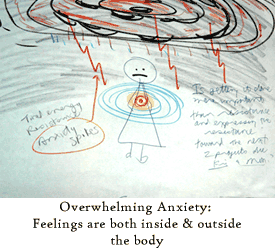
- Worry about an upcoming challenge, performance, test, medical procedure, etc, or chronic worry about life stressors, such as finances.
- Anger at a boss, person of authority, or a loved one that we have been unable to express, so we internalize this within ourselves.
- Anger at ourselves for a perceived shortcoming, problem, or failure.
- Unexpressed feelings of guilt.
- Fear due to a chronic lack of safety in one's environment or relationships.
- Fear due to unresolved past trauma, leading to hypervigilance.
Even though anxiety is called a mental disorder, the tension between the rising emotions and the force to keep them down can be felt physically. Anxiety appears in folks in a variety of ways, usually in odd behaviors and physical complaints. Some of the most common symptoms of anxiety are:
- Chronic tension in the body, such as the jaw, neck and shoulders, gut, etc. Headaches and digestive problems are often anxiety related.
- Over-controlling or repetitive behaviors, such as excessive cleanliness or rituals.
- Poor sleep: difficulty falling asleep or staying asleep.
- Nightmares
- Over eating for comfort, or loss of appetite and under eating.
- Fears and phobias; avoidance of anxiety-producing situations.
- Odd but familiar habits, such as nail biting, hair pulling, knuckle popping, lip biting, etc.
- Feelings of unreality and depersonalization.
- An inability to relax without the use of substances
Panic attacks are probably the form of anxiety that we hear about the most. Because they can seem so dramatic and scary, panic attacks grab our attention most easily. The signs of panic include short rapid breath; rapid heartbeat; cold clammy hands; sweat; muscle tension; fears of suffocation or passing out. It is not uncommon to feel that one might die from the difficulty breathing, but panic attacks are rarely life threatening.
What makes anxiety symptoms hard to notice and treat is that they most often appear entirely disconnected from the actual cause or trigger. We tend to adapt to the discomfort over time, and do not seek help until our coping mechanisms break down. A good first step to discovering the root of the anxiety is to notice the earliest low level signs of tension in your body and ask yourself: "If I could feel my emotions, what would they be now?" Often we need help from someone else to help us see what we cannot recognize on our own.
Treating anxiety with somatic psychotherapy can be done with:
- Chronic tension in the body, such as the jaw, neck and shoulders, gut, etc. Headaches and digestive problems are often anxiety related.
- Over-controlling or repetitive behaviors, such as excessive cleanliness or rituals.
- Poor sleep: difficulty falling asleep or staying asleep.
- Nightmares
- Over eating for comfort, or loss of appetite and under eating.
- Fears and phobias; avoidance of anxiety-producing situations.
- Odd but familiar habits, such as nail biting, hair pulling, knuckle popping, lip biting, etc.
- Feelings of unreality and depersonalization.
- An inability to relax without the use of substances
Depression
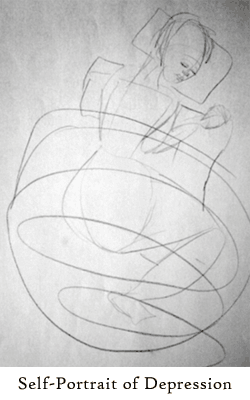 Putting it very simply, there are two kinds of depression: one is the kind caused by painful life circumstances, losses and relationships; the other is caused by fundamental dysfunction in the biochemistry of the brain, usually because of hereditary factors, or, in women, hormonal shifts, such as peri-menopause, menopause, pregnancy or childbirth. The first kind of depression may be caused by any of a number of losses (financial, health, relationship) that we feel inadequate to deal with successfully, or relationship conflicts which we feel helpless to resolve, so we internalize the conflict instead. Additionally, we may become depressed by being around other depressed people, like spouses, partners, and family members. Young children are especially vulnerable to identifying with depression in their parents, and can grow up with an "emotional low water mark" that they can never exceed to feel good.
Putting it very simply, there are two kinds of depression: one is the kind caused by painful life circumstances, losses and relationships; the other is caused by fundamental dysfunction in the biochemistry of the brain, usually because of hereditary factors, or, in women, hormonal shifts, such as peri-menopause, menopause, pregnancy or childbirth. The first kind of depression may be caused by any of a number of losses (financial, health, relationship) that we feel inadequate to deal with successfully, or relationship conflicts which we feel helpless to resolve, so we internalize the conflict instead. Additionally, we may become depressed by being around other depressed people, like spouses, partners, and family members. Young children are especially vulnerable to identifying with depression in their parents, and can grow up with an "emotional low water mark" that they can never exceed to feel good.
Depression may be difficult to acknowledge because of the social stigma associated with mental illness and because the initial symptoms are often physical, not emotional. Whichever kind of depression you may be experiencing, any depression is actually a brain disorder characterized by changes in thoughts, behaviors, and feelings that last for two or more weeks.
For those who have dwelt in depression's dark wood, and known its inexplicable agony, their return to the abyss is not unlike the ascent of the poet trudging upward & upward, out of hell's black depths, and at last emerging into what he saw as "the shining world."
There, whoever has been restored to health has almost always been restored to the capacity for serenity and joy, and this may be indemnity enough for having endured the despair beyond despair.
- William Styron
printable version |
Physical Symptoms:
- Changes in Sleep Patterns: insomnia; intermittent awakening; early awakening and inability to fall back asleep; difficulty getting out of bed in the morning; hypersomnia (sleeping a lot or staying in bed all day).
- Changes in Appetite: Loss of appetite and weight; overeating, binge eating, and gaining weight.
- Energy: Lack of energy; difficulty getting started; less energy in the morning, even after a full night's
sleep. In severe cases, psychomotor retardation occurs, and an individual moves only very slowly.
- Lack of pleasurable activities.
- Sex Drive: Lack of interest in sex.
- Fears and phobias; avoidance of anxiety-producing situations.
- Odd but familiar habits, such as nail biting, hair pulling, knuckle popping, lip biting, etc.
- Feelings of unreality and depersonalization.
- An inability to relax without the use of substances
Emotional Symptoms:
- Pervasive feelings of sadness, helplessness, hopelessness, guilt, or unworthiness.
- Changes in Appetite: Loss of appetite and weight; overeating, binge eating, and gaining weight.
- Feeling numb, unable to identify one's feelings; apathy.
- Irritability and temper outbursts;
impatience
- Lack of positive response to good news or positive events.
Mental Symptoms:
- Negative thoughts and excessive worry.
- Concentration: Lack of concentration;
inability to sustain focus for normal
work, study, or pleasure activities,
such as reading, watching TV or movies,
etc.
- Motivation: Lack of motivation to
complete work tasks, daily hygiene,
or household chores.
- Forgetfulness.
- Difficulty making decisions.
- Wishing life were over; thinking
others would be better off without
you.
- Suicidal thoughts or plans.
Behavioral Symptoms:
- Giving up pleasurable activities
and hobbies.
- Procrastination; not starting or
finishing projects.
- Social withdrawal; not responding
to phone calls or emails.
- Negative coping behaviors, such as
increased use of alcohol, recreational
drugs, nicotine, etc.
- Difficulty making decisions.
- Wishing life were over; thinking
others would be better off without
you.
- Poor Hygiene: Lack of attention to daily hygiene; not bathing, shaving, or getting dressed every day.
If you think you are depressed, the sooner you seek help, the better, as untreated depressions worsen and increase the risk of recurrence. If most of your symptoms are physical or behavioral, or you are feeling suicidal, you should begin by calling your medical doctor or a psychiatrist as soon as possible. Otherwise, you can begin with a good psychotherapist for an evaluation to see if medication and a referral to a psychiatrist are warranted.
There are many effective treatments for depression. Somatic Psychotherapy and Mind/Body Medicine can help by:
- Tracking your history of depressions and identifying triggers.
- Identifying internalized emotions and their negative effects in the body.
- Resolving internal conflicts to ease internal tension.
- Improving self-assertion and communication for resolving external conflicts.
- Restoring energy to the body, mind, and spirit.
Thursday, 6/11/36
I can only, after two months, make this brief note, to say at last after two months dismal and worse, almost catastrophic illness - never so near the precipice to my own feeling since 1913 - I'm again on top..Oh but the divine joy of being mistress of my own mind again!
Sunday, 6/21/36
After a week of intense suffering - indeed mornings of torture - and I'm not
Exaggerating - pain in my head - a feeling of complete despair and failure - a head inside like the nostrils after hay fever - here is just a cool quiet morning again, a feeling of relief, respite, hope.
Tuesday, 6/23/36
A good day - a bad day - so it goes on. Few people can be so tortured by writing as I am. Only Flaubert I think. Yet I see it now, as a whole. I think I bring it off, if I only have courage and patience: take each scene quietly: compose: I think it may be a good book.
Not so clear today.My brain is like a scale: one grain pulls it down. Yesterday it balanced: today dips.
- Virginia Wolf
A Writer's Diary
printable version |
Bipolar Disorder
Bipolar Disorder is a mental illness
characterized by mood swings between
the poles of depression and mania.
In addition to recurring lows of depression,
folks with Bipolar Disorder also experience
high periods, called manias. Either state can
last from a few days to weeks and months.
Bipolar Disorder can be hard to
recognize and diagnose for a few reasons:
in the beginning of the illness, most
individuals may experience several periods
of depression before the manic periods emerge;
when the either the depressions or the manias
are severe and uncomfortable, some people try
to relieve their symptoms with alcohol or other
drugs, which may mask the symptoms or induce
further mood swings; and some people find the
hypomanic period to be a creative or productive
time that feels "normal" compared to depression.
Most commonly, Bipolar Disorder
is missed because not all manias are pleasant
or euphoric, and folks don't realize that their
mood shift is manic. In fact, manias can be
characterized by extensive periods of euphoria;
expansive and grandiose thinking; or irritability,
anger and rage.
Some other signs of mania include:
- Inflated self-esteem or grandiosity.
- Temper outbursts or rage attacks;
- Critical or impatient with others who aren't moving at your pace or
interested in what interests you. Similarly, you don't receive criticism
or redirection well.
- More talkative than usual; pressured speech; others can't keep up with you're saying.
- Feeling that your thoughts are racing and you can't keep up with them.
- Easy distractibility; can't follow a straight line of thought or action.
- Taking on more and more activities, even if you aren't completing them.
- Poor judgment and increased impulsivity, such as excessive spending.
- Risky behaviors, such as sexual indiscretion, speeding, etc.
- Self-medication to calm yourself.
To further complicate matters, some moods are "mixed" states, with signs of both depression and mania, such as agitation and exhaustion.
Because there are many fine points to consider, the diagnosis of Bipolar Disorder is best made by a mental health professional, and treatment should include a whole "team:" you, your doctor, a psychotherapist, and your support system. Unlike many ailments, episodes of Bipolar Disorder cannot be "toughed out." While a particular episode may end and mood may shift, the cycle of disease continues. Treatment of the disorder always requires a doctor's care for medication management to decrease the frequency and severity of the mood cycles.
Even though Bipolar Disorder is caused by a biochemical dysfunction in the brain, life stressors and circumstances can trigger shifts. Psychotherapy and Mind/Body medicine can help by:
- Tracking your history of highs and lows, and identifying your personal triggers.
- Helping you make changes and adjustments at the early warning signs of a shift.
- Helping you discern when a behavior is a sign of a depression or mania, and when it is a normal life response.
- Creating your best ally: a regular daily schedule.
- Minimizing stressors.
- Teaching you the Relaxation Response to minimize your reactivity to acute stressors.
- Distinguishing medication side effects from symptoms, and helping you give feedback to your doctor.
- Poor judgment and increased impulsivity, such as excessive spending.
- Keeping you on track towards your life goals and intentions; creating meaning and identity beyond your mental illness.
Trauma and PTSD
Every being that lives, grows.
Each will grow despite harsh conditions
And beautify its surroundings.
Like a tundra bloom,
The most striking and beautiful
Flower is the one that blossoms
Despite frigid, brutal conditions.
- Judith Garrett Garrison &
Scott Shepherd
printable version |
When we hear the word "trauma", we usually think of a life threatening emergency or catastrophic event. In psychotherapy, however, not all "trauma" is life threatening. There is "Trauma" with "a big T": life threatening events, and "trauma" with "a little t": events that overwhelm our coping capacity and lead to nervous system dysregulation. Many of us experience the second kind of trauma without calling it traumatic, and have ongoing effects without realizing their connection to the traumatic event.
In somatic psychotherapy,
we distinguish between two different kinds
of trauma: developmental trauma and shock
trauma. Developmental traumas are events
and interactions that are mismatched or
misattuned to the child's developing brain,
nervous system, or temperament. These are
usually traumas with a "little t." Some
examples include inadequately reflecting
positive emotions; punishing negative emotions;
humiliation; lack of physical affection; excessive
authoritarian demands; expecting children to
meet our emotional needs. Even well meaning
parents can contribute to developmental trauma.
In order to tolerate these faulty interactions,
children develop character defenses or personality
styles that become generalized and projected into
future relationships as well. See Character Style.
Shock traumas are events characterized by brief, sudden, and massive impact on an individual, often perceived as life threatening. These are more often traumas "with a big T", such as natural disasters and motor vehicle accidents, or violence, such as physical and sexual assaults, sexual abuse, domestic violence, and combat, etc. These traumas have immediate and profound effects on the nervous system, eliciting either the "Fight or Flight" response, freeze response, or dissociation.
Repeated shock trauma early in a
person's life, such as childhood physical
or sexual abuse, can contribute to character
styles as well. The Diagnostic and Statistic
Manual of Mental Disorders (DSM IV) recognizes
this as Borderline Personality Disorder.
Certainly these interactions create negative
internalized self-images that continue to affect
us in future relationships with feelings of low
self worth.
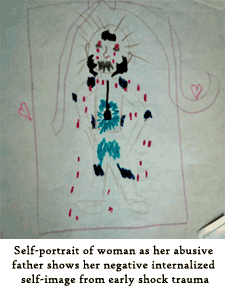 Post Traumatic Stress Disorder (PTSD)is the term the DSM IV gives to the long term
negative effects of shock trauma. Some of these
effects are:
Post Traumatic Stress Disorder (PTSD)is the term the DSM IV gives to the long term
negative effects of shock trauma. Some of these
effects are:
- Re-experiencing Symptoms:The body/mind replays the traumatic events
as intrusive memories, nightmares, or flashbacks.
Sensitivity to anniversaries of the event.
- Avoidance Symptoms:The individual avoids any reminders of the events,
such as places and people associated with them.
Emotional numbness & estrangement from others.
- Hyperarousal Symptoms:The individual is always "on alert" and "on guard" for danger or any reminders of the traumatic events. Difficulty relaxing without using substances.
Any effective treatment of trauma involves re-experiencing the troubling aspects of the event with more effective resources than were available to the individual at the time. Both timing and "dosage" have to be right for the effective treatment of shock trauma. Timing refers to what else is going on your life at this time, and dosage refers to the degree of re-exposure to the past events.
While most people who want help with trauma want it as quickly as possible, the pace of treatment must not exceed an individual's capacities to deal with re-experiencing aspects of the event. For this reason, we discuss whether or not this is a good time in your life to deal with past trauma; periods of high emotional or physical stress, school finals, Board exams, job transitions, home remodeling, etc., which already call upon our internal resources, are generally not good times for trauma work. We also consider the amount of emotional support you have in your life; whether or not you are using substances to alter your moods; and any self-destructive behaviors. If you have problems in any of these areas, we begin by building your internal and external resources before doing trauma work.
Some Effective treatment techniques for either developmental or shock trauma are EMDR and Somatic Experiencing. Peter Levine's Waking the Tiger offers an excellent description of trauma effects and resolution. A CD collection of his treatment for trauma, called "Healing Trauma", is available through www.Soundstrue.com.
Dissociation
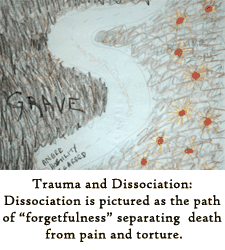 Dissociation is a disruption in one or more of the ego functions of consciousness, memory, identity, or perception of the environment. The experience of dissociation is common to all humans. For example, we are dissociating when we daydream while driving and miss our exit on the freeway, or arrive at home and wonder how we got there without paying attention.
Dissociation is a disruption in one or more of the ego functions of consciousness, memory, identity, or perception of the environment. The experience of dissociation is common to all humans. For example, we are dissociating when we daydream while driving and miss our exit on the freeway, or arrive at home and wonder how we got there without paying attention.
Dissociation is both a defense mechanism and a symptom of an underlying problem. During times of traumatic stress, such as a life-threatening assault, we might dissociate and "leave the body" when facing overwhelming terror. In this case, dissociation is a defense mechanism as it protects us from dealing with something we are not prepared for. Later, we might begin to dissociate under familiar
circumstances that remind us of the past trauma; now dissociation is a symptom of an unresolved issue. As either a defense or a symptom, excessive dissociation interferes with our fullest functioning.
In treating dissociation we are looking to restore and integrate an aspect of individual experience to wholeness so that the individual can function more optimally. The treatment process is necessarily slow, as we have to take care not to flood the individual with too much experience. After all, it was overwhelming distress that caused the defense to arise in the first place. Most of all, we do not want to retraumatize someone with the intended treatment!
Some of the steps and strategies for treating dissociative disorders with Somatic Psychotherapy and Mind/Body Medicine include:
- Assessing the kinds and degrees of dissociation an individual uses, and how they interfere with life activities.
- Creating a body map for physical dissociation, or a life history map for traumatic events.
- Preparation for treatment by resourcing and teaching Relaxation Response techniques.
- Using Somatic Experiencing, we begin with the smallest imaginal exposure that is tolerable to an individual, and titrate further exposures so that we stay within tolerable limits. In this way we teach the body/mind to handle painful experience and expand an individual's capacity to integrate the split- off aspects. (Honestly, this is not as dreadful as it sounds to most people!)
- Using hypnosis, we can create an internal safe place and allow material to come to consciousness only as the conscious mind is ready. In fact, by centering on the right brain and cutting down on left-brain chatter, hypnosis itself is a therapeutic form of dissociation.
- Using EMDR, we can move between different states, map them three dimensionally, including their physical aspects, and integrate them through the central observer.
Eating Disorders
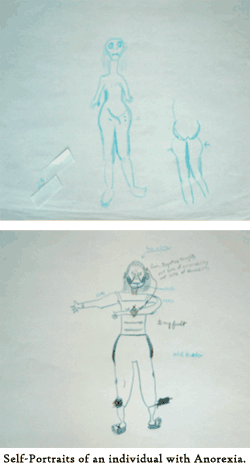 In general, eating disorders are divided into two types: Anorexia, or restrictive eaters, who limit their food intake, and Bulimics, overeaters or bingers, who eat excessively and then often purge their food through forced vomiting, diuretics and laxatives, or excessive exercise. There are any number of variations in between, such as eating only once a day, or only after 5PM; eating only certain kinds of food; eating alone so no one else can see what you're eating; etc. The result is abnormal weight range, including severely underweight women with Anorexia, and sometimes moderately overweight women with Bulimia. Other health problems follow, including abnormal electrolyte and potassium levels; anemia; amenorrhea; loss of dentition; esophageal scarring; cardiac, kidney, and liver problems. Early and severe anorexia may contribute to infertility in adulthood.
In general, eating disorders are divided into two types: Anorexia, or restrictive eaters, who limit their food intake, and Bulimics, overeaters or bingers, who eat excessively and then often purge their food through forced vomiting, diuretics and laxatives, or excessive exercise. There are any number of variations in between, such as eating only once a day, or only after 5PM; eating only certain kinds of food; eating alone so no one else can see what you're eating; etc. The result is abnormal weight range, including severely underweight women with Anorexia, and sometimes moderately overweight women with Bulimia. Other health problems follow, including abnormal electrolyte and potassium levels; anemia; amenorrhea; loss of dentition; esophageal scarring; cardiac, kidney, and liver problems. Early and severe anorexia may contribute to infertility in adulthood.
All types of eating disorders share the features of a distorted body image, low self-esteem, and overcontrolling the body and emotional states with food. Most often there is an underlying anxiety disorder or depression as well. Food is treated as a mood-and image-altering substance, for better or worse. At the end of the day, self-worth is measured in how successfully one has either restricted food, or purged or exercised away its effects.
Because eating disorders can be life-threatening, their diagnosis and treatment is complicated and require a team of care providers, including: an MD with experience in this area, regular lab work, and access to an inpatient program; a nutritionist for education, daily meal plans and weekly weight monitoring; group therapy; and individual therapy.
There are many factors that contribute to developing an eating disorder, including family dysfunction; social forces; anxiety and depression; and character style.
Somatic Psychotherapy can assist in healing from an eating disorder by:
- Identifying triggers to binge and desensitizing you to them.
- Improving tolerance for negative emotions.
- Developing alternative ways of self-soothing
- Developing authentic self-worth.
- Using hypnosis, we can create an internal safe place and allow material to come to consciousness only as the conscious mind is ready. In fact, by centering on the right brain and cutting down on left-brain chatter, hypnosis itself is a therapeutic form of dissociation.
- Resolving internal conflicts, family dysfunction, etc.
Medical Conditions & Syndromes
At times I feel the winds of illness
have made a barren landscape of my life.
I can no longer see mountains to be
climbed in the distance.
But then I look around me and
I realize that I am soaring
above the mountains.
They look so small from my new
perspective.
- Judith Garrett Garrison &
Scott Shepherd
printable version |
Mind/Body Medicine and Somatic Psychotherapy can play an important role as "complementary medicine" in recovering from serious medical conditions and chronic syndromes. Along with your medical care providers, a somatic psychotherapist can be part of your treatment team and help you bridge the gap between your mind and body when you need it most.
Whether we are facing a life threatening illness or a chronic syndrome, the diagnosis of a serious medical condition triggers an emotional and psychological alarm in the body that can impair our coping ability. Foremost among our reactions are shock, fear, anxiety, and depression. A common and troubling response is feeling betrayed and angry at our own body. If we do not acknowledge the devastating emotional effects of a medical condition, we will be left with only a fraction of our resources in trying to recover.
The treatment of many serious medical conditions can be enhanced by Mind/Body Medicine. The most common conditions for which people seek additional help are the diagnosis of cancer, chronic pain syndromes, organ transplants, heart attacks and cardiac procedures, among others. In these serious cases, it is most helpful to know that you are not alone, and you have someone who is willing to face dreaded circumstances along with you.
Mind/Body Medicine assists in treatment by:
- Identifying and safely expressing
emotional reactions.
- Avoiding internalized emotions,
especially anger and feelings of
helplessness.
- Assisting with the grieving process.
- Recovering from depression,
which aids the overall healing process.
- Relaxation techniques and guided
imagery for healing.
- Recovery from medical procedure
trauma, especially with Somatic
Experiencing.
- Processing information and
making decisions.
- Creating adaptive and hopeful
meaning from your experience.
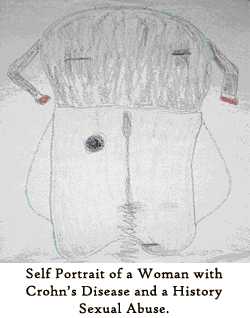 Syndromes are a special category of medical conditions, as they are multiple
system dysregulation brought on over time. Some examples of syndromes are Chronic Fatigue Syndrome, Fibromyalgia, Multiple Chemical Sensitivity Syndrome, Irritable Bowel Syndrome, etc. Autoimmune Disorders are also considered syndromes, in which one body system misidentifies other parts of itself as a threat or "the enemy." It is usually impossible to pinpoint exactly when a syndrome starts, but it is very common for folks with these conditions to have histories of extreme trauma (such as childhood sexual or physical abuse; intense family conflict; severe and chronic stress). For this reason, the etiology of syndromes appears related to stress reactions and the eventual disregulation of the sympathetic and parasympathetic nervous systems.
Syndromes are a special category of medical conditions, as they are multiple
system dysregulation brought on over time. Some examples of syndromes are Chronic Fatigue Syndrome, Fibromyalgia, Multiple Chemical Sensitivity Syndrome, Irritable Bowel Syndrome, etc. Autoimmune Disorders are also considered syndromes, in which one body system misidentifies other parts of itself as a threat or "the enemy." It is usually impossible to pinpoint exactly when a syndrome starts, but it is very common for folks with these conditions to have histories of extreme trauma (such as childhood sexual or physical abuse; intense family conflict; severe and chronic stress). For this reason, the etiology of syndromes appears related to stress reactions and the eventual disregulation of the sympathetic and parasympathetic nervous systems.
Because it understands the central nervous system and works with the complex relationship between the sympathetic ("Fight or Flight" or "Stress Response") and parasympathetic ("Relaxation Response") nervous systems, Somatic Experiencing is a very helpful method of working with syndromes.
For more information on how Mind/Body Medicine and Somatic Psychotherapy can assist in dealing with infertility and miscarriage, please see www.healinginfertility.com.
Pain Management
Most people would not think of seeing a psychotherapist, even a somatic psychotherapist, for pain management. For most of us, physical pain begins as a medical problem rather than an emotional or psychological one. Also, some people may feel insulted or dismissed by the suggestion to seek psychological help for their pain, as if they were being accused of fabricating their symptoms.
However, there are some very good reasons for seeking the help of a somatic psychotherapist when dealing with chronic pain. Medical science recognizes that the experience of pain is highly personal and subjective, and it cannot always be objectively measured or quantified. Certainly we cannot quantify or stand in judgment of a personís suffering. Even pain for which a clear physiological cause cannot be identified needs to be addressed and treated.
Some good times to seek psychological help for physical pain are:
- When lifestyle factors may be contributing to pain.
- When physical pain is inhibiting your activities of daily living or forcing lifestyle changes.
- When your pain is affecting those around you.
- When pain is accompanied by depression or anxiety.
- When pain is due to an unresolved emotional issue or conflict.
- When pain is due to a traumatic injury that needs to be resolved.
- When you have maximized the benefits of medication or the medication side effects are interfering with your mood or lifestyle.
- When you feel out of control with your pain.
Somatic psychotherapy can assist with effective pain management, and, in some
cases decrease pain and suffering, by:
- Alleviating depression and anxiety associated with pain.
- Teaching you the Relaxation Response and breaking the cycle of tension that contributes to pain.
- Helping you challenge and correct negative beliefs and cognitive distortions.
- Identifying and treating the factors which can worsen the pain experience, such as a history of sexual or physical abuse.
- Resolving any emotional conflicts or traumas that contribute to pain.
- Manage stressors associated with pain, such as disability claims, loss of work, etc.
- Decrease your reliance on pain medications.
Psychosomatic Disorders
Contrary to popular culture, psychosomatic disorders are neither "imaginary" nor "all in your head." The term "psychosomatic" comes from the Greek "psyche" for "mind" and "soma" for "body" and refers to the complex relationship between the mind and body as it affects our health and well-being. Psychosomatic disorders are medical conditions that are related to emotional states or conflicts, both conscious and unconscious. When all medical causes of a physical complaint have been explored and ruled out, we have to consider other origins, such as the mind, and the individual's total experience in their environment.
Classically, psychosomatic disorders are
viewed as arising from unresolved emotional
conflicts that are internalized and expressed
physically. Frequently the emotional state is
expressed in a "body language metaphor", such as
being around someone who is "a pain in the neck"
leads to headaches; "I can't stomach him" leads to
gut tension and digestive problems; not speaking up
for oneself is expressed as tight jaw muscles, teeth
grinding, and tongue biting.
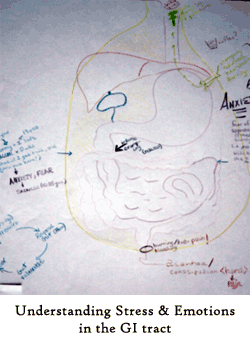 Most often, psychosomatic disorders are
actually the result of stress responses. When we
experience stress, our body reacts with "the Stress
Response," releasing stress hormones that create
the physical changes necessary for defensive action. When stress is chronic, without sufficient relief and time for recovery, body systems bear the tension and begin to dysfunction. One very common example of this internalized stress response is
seen in digestive problems: over or undereating, eating in a hurry, and poor food choices are all responses to stress. Over time, the gut responds to the stress with increasing dysregulation, leading to indigestion, bouts of diarrhea and constipation, intestinal spasms, poor gut environment and ulcers. When the individual's stress response is adequately treated, the physical symptoms improve or disappear. Most often, psychosomatic disorders are
actually the result of stress responses. When we
experience stress, our body reacts with "the Stress
Response," releasing stress hormones that create
the physical changes necessary for defensive action. When stress is chronic, without sufficient relief and time for recovery, body systems bear the tension and begin to dysfunction. One very common example of this internalized stress response is
seen in digestive problems: over or undereating, eating in a hurry, and poor food choices are all responses to stress. Over time, the gut responds to the stress with increasing dysregulation, leading to indigestion, bouts of diarrhea and constipation, intestinal spasms, poor gut environment and ulcers. When the individual's stress response is adequately treated, the physical symptoms improve or disappear.
Even deeper and unconscious emotions can be expressed and revealed psychosomatically. For example, when a couple is having relationship problems, one partner may develop genital disorders that prevent sexual intimacy. A common male response is erectile dysfunction, but the body can also respond with latent venereal diseases at these times, such as an initial outbreak of herpes or condyloma, even when no outside sexual activity has occurred.
Mind/Body Medicine and Somatic Psychotherapy can be very helpful in recovering from psychosomatic disorders by helping you:
- Understand the physiology of the body in relation to emotions.
- Identify unresolved emotional conflicts.
- Recovery from medical procedure
trauma, especially with Somatic
Experiencing.
- Gain assertion and self-expression in safe ways.
Hypnosis can be very helpful in accessing the right brain emotional and body language experience of a psychosomatic disorder. Letting a body part speak directly can reveal repressed messages, fears, and desires that need to be acknowledged and integrated. For more information on treating syndromes, see Medical Conditions and Syndromes.
Character Style
There are many different schemas for understanding human development and character styles in psychotherapy: Psychoanalytic (Freudian), Object Relations (Kleinian), Ego Psychology (Erickson), Cognitive (Piaget), etc. Even within the area of somatic psychotherapy, there are different schools of character style, such as Wilhelm Reich and Alexander Lowen.
Remember that life is first a somatic experience? From this perspective, personality and character are based in biology, influenced by numerous and repeated interactions with the environment, including our early care providers. The school of charcter style that I use the most comes from Bodynamic Analysis, based on the idea that psychomotor development preceeds cognitive development. Bodynamics suggests that at each point of development, certain muscle groups are activated in the performance of developmental tasks, such as holding up one's head, crawling, walking, etc. Character structure is determined by how one adapts to the developmental tasks at each stage, reflected in psychomotor development and muscle tone for that stage. For each stage of developmental, there are three possible positions, corresponding to muscle tone: healthy (neutral tone), early (hypo or flaccid tone), and late (hyper or rigid). If developmental stress is within tolerable limits for an individual, and does not exceed their resources, their tone will be healthy and neutral, and their attidue will be adaptive and flexible. However, if the stress is excessive and occurs early in a stage, before the muscle skills are activated, their tone will be flaccid, with less energy, and an individual's psychological position is one of relative helplessness in that arena. On the other hand, if the excessive stress occurs late in a stage, after the muscle skills have been acquired, they will become rigid and an individual's energy and attitude will be constricted in that arena.
Most importantly, all of these developmental tasks take place in the service of creating and maintaining mutual connection with other human beings. During each stage of development, the parent child relationship centers on a particular theme of connection, shown below:
| Beginning (Early) | Theme of Connection | End (Late) |
| 2nd Trimester | Existence
Developing a secure sense of existence | 3 Months |
| 1 Month | Need
Developing a sense that our needs are met | 1 1/2 Years |
| 8 Months | Autonomy
Developing a sense & capacity to explore
the world, moving away from mother. | 2 1/2 Years |
| 2 Years | Will
Developing the sense of having our own
power, will, & intention, & still being loved. | 4 Years |
| 3 Years | Love/Sexuality
Developing the capacity for deep romantic
and sensual/sexual feelings.
| 6 Years |
| 5 Years | Opinions
Forming & expressing deep beliefs & opinions
about the world & reality. | 8 Years |
| 7 Years | Solidarity/Performance
Belonging to a group without needing to
be special, but with our uniqueness valued.
| 12 Years |
Unlike the psychodynamic schools of human development, the somatic schools begin with intrauterine or fetal development, and take birth experiences into account.
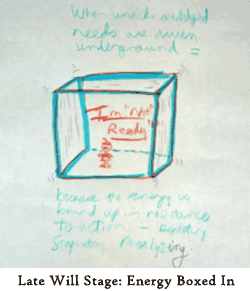 Character styles can reflect either developmental deficits or over-adaptations to early relationships and environmental circumstances.
As we development cognitively, we acquire distorted
and faulty core beliefs about ourselves and others
that reflect these styles of character. "States
become traits" and behaviors become
(unquestioned) habits and patterns of relating to
others. As an example, one common pattern from
the late Will stage is the pattern of procrastination,
originating in excessively withholding and
constraining energy and will in resistance to others.
We do this later in life to our own detriment.
Character styles can reflect either developmental deficits or over-adaptations to early relationships and environmental circumstances.
As we development cognitively, we acquire distorted
and faulty core beliefs about ourselves and others
that reflect these styles of character. "States
become traits" and behaviors become
(unquestioned) habits and patterns of relating to
others. As an example, one common pattern from
the late Will stage is the pattern of procrastination,
originating in excessively withholding and
constraining energy and will in resistance to others.
We do this later in life to our own detriment.
Relationship Problems
After a while you learn the subtle
difference between holding a hand
and chaining a soul.
And you learn that love doesn't mean
leaning and company doesn't mean
security.
And you begin to learn.
And kisses aren't compromises.
And presents aren't promises.
And you begin to accept your defeats
with your head up & your eyes ahead
with the grace of a woman or a man
not the grief of a child.
And you learn to build all your loads
on today,
Because tomorrow's ground is too
uncertain for plans
And futures have a way of falling down
mid-flight.
After a while you learn that even
sunshine burns if you ask too much.
So you plant your own garden
And decorate your own soul
Instead of waiting for someone to buy
you flowers.
And you learn that you really can
endure,
That you really are strong.
And you really do have worth.
And you learn. Andyou learn.
With every experience you learn.
- Anonymous
printable version |
Coming Soon.
|






